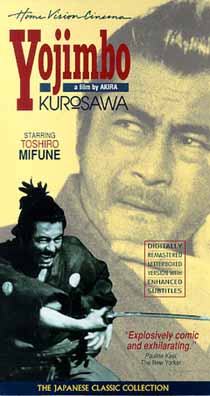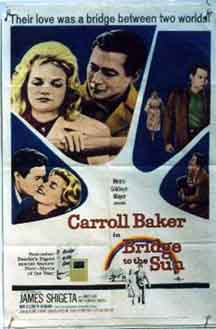
 |
|
|
|
|
|
FILM HOME PAGE
|
FEATURING ASIAN PACIFIC AMERICANS Click HERE for Part 2 
PORTRAIT IN BLACK (1961) Directed by Terence Young Cast: Lana Turner, Anthony Quinn, Richard Basehart, Sandra Dee, John Saxon, Ray Walston, Virginia Grey, Anna May Wong, Dennis Kohler, Lloyd Nolan, Elizabeth Chan, John Wengraf, John McNamara, George Womack, Paul Birch, Robert P. Lieb, James Nolan, Richard Norris One of the few things noteworthy about this film is that it was one of the last films that Anna May Wong participated in. Ms. Wong, one of the first Chinese American stars of the film industry, was trying to revive her career her career before she died in 1961. For further information on the great Anna May Wong, please click HERE! The film's plot is a scheming wife and her doctor lover do away with her rich husband. Just when it seems that they've gotten away with the crime, they get an anonymous letter from somebody who knows all about their nasty little deed. Will the murderers be brought to justice? Just another original story that has been played again and again and again, with the last example being the Michael Douglas film with the lead character plays an amoral character wandering through life making people's lives miserable. In other words, just another Michael Douglas film. (see Wall Street, Fatal Attraction, etc.) FLOWER DRUM SONG Directed by Henry Koster Cast: Nancy Kwan, James Shigeta, Benson Fong, Jack Soo, Juanita Hall, Reiko Sato, Patrick Adiarte, Kam Tong, Beulah Quo, Soo Yong, Victor Sen Yung, Ching Wah Lee, Arthur Song, James Hong, Miyoshi Umeki, Spencer Chan 
Looking for a realistic, incisive view of 1960s Chinatown? Forget it! This Rodgers & Hammerstein musical is all fluff. But it's also Hollywood's only (almost) all-Asian movie. (Juanita Hall, who plays Madame Liang, is African American. She originated the role on Broadway and replaced Anna May Wong, who was originally set to play the role in the movie but died before filming began.) Ignore the sitcom plot, the corny jokes, and the silly musical numbers (including the embarrassing "I Enjoy Being a Girl") and relish the sight of some veteran Asian American talent taking the spotlight. Jack Soo (in a role played in "Yellowface" on Broadway) is not to be missed. Some interesting notes: There is a website devoted to fans of this movie that is located HERE and did you know that Anna May Wong was scheduled to be in the movie before she died. 
YOJIMBA Directed by Henry Koster Cast: Toshirô Mifune, Eijirô Tono, Kamatari Fujiwara, Takashi Shimura, Seizaburô Kawazu, Isuzu Yamada, Hiroshi Tachikawa, Kyu Sazanka, Tatsuya Nakadai, Daisuke Katô, Ikio Sawamura, Ko Nishimura, Yoshio Tsuchiya, Yôko Tsukasa, Susumu Fujita, Eisei Amamoto This semi-comic 1961 film by legendary director Akira Kurosawa (Rashomon, Ran) was inspired by the American Western genre. Kurosawa mainstay Toshirô Mifune (The Seven Samurai) plays a drifting samurai for hire who plays both ends against the middle with two warring factions, surviving on his wits and his ability to outrun his own bad luck. Eventually the samurai seeks to eliminate both sides for his own gain and to define his own sense of honor. Yojimbo is striking for its unorthodox treatment of violence and morality, reserving judgment on the actions of its main character and instead presenting an entertaining tale with humor and much visual excitement. One of the inspirations for the "spaghetti Westerns" of director Sergio Leone and later surfacing as a remake as Last Man Standing with Bruce Willis, this film offers insight into a director who influenced American films even as he was influenced by them. --Robert Lane (note: Just another case that Western films and their directors has indeed been influenced by talented artists from Asia! (1961)
Directed by Étienne Périer Cast: Carroll Baker, James Shigeta, James Yagi, Tetsuro Tamba, Hiroshi Tomono, Yoshiko Hiromura, Sean Garrison, Ruth Masters, Lee Payant, Nori Elisabeth Hermann, Emi Florence Hirsch
This is the true story of Gwen Terasaki who married a Japanese diplomat before World War Two and then returned with him to Japan after Pearl Harbor. It tells the story of the war from an entirely new perspective, and is the first film to depict the racial nature of the Pacific war, and to depict the suffering of the common Japanese people.
site design by Asian American Artistry |